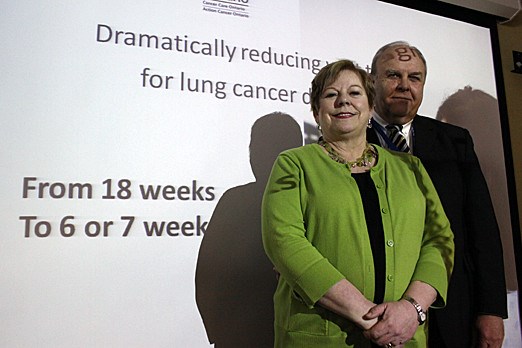Improved co-ordination between health-care professionals will reduced wait times for patients with suspicion of lung cancer by half, a Regional Cancer Care doctor said Wednesday.
Officials with the Regional Cancer Care Northwest announced their plan to reduce patient wait times from 18 weeks to about about six or seven weeks.
The Lung Diagnostic Assessment Program follows in the footsteps of the Colorectal Diagnostic Assessment Program that started about a year ago. The program has helped to reduce the wait times for colorectal patients through better communication between health-care professionals.
About 80 to 100 patients per year come into the Regional Cancer Care clinic for suspicion of lung cancer. Meanwhile, in one year the Regional Cancer Care Northwest sees about 150 lung cancer patients.
Dr. Heather McLean, primary care lead for the Regional Cancer Care at the Thunder Bay Regional Health Sciences Centre, said a patient suspected of lung cancer needs to be diagnosed quickly.
The program ensures that the patient doesn’t have any hold ups.
"We have multiple health-care professionals who are working to aid that patient in either being diagnosed with lung cancer or being confirmed that they do not have lung cancer," McLean said. "It happens by following the patient through the program and ensuring that there is no excess wait times or that different departments are talking to each other."
McLean used to refer her patients to a specialist and hoped they would get in to see them as soon as possible. With the program, the patient sees a variety of other health-care professionals before they reach the specialist.
That ensures the patient has an up-to-date knowledge on what’s going on provided by either a nurse or other health-care provider, she said.
McLean added that this method of assisting patients could soon apply to other types of cancers.
Doctors diagnosed Gail Pfaff with lung cancer about seven years ago. Doctors caught the disease in its first stage and were able to treat her quickly. The 59-year-old cancer survivor calls her doctor a hero.
While the lung cancer program didn't exist when she was diagnosed, Pfaff said she couldn’t imagine what some people had to go through who had to wait nearly five months.
"You’re on this journey and you’re fighting it and you’re worrying and you’re concerned," Pfaff said. "I am going to live? Am I going to die? How long to do I have? You want (a diagnoses) fast. Waiting 18 weeks would have just been awful. I couldn’t even imagine it."
Pfaff said she has a love hate relationship with her experience. She hates cancer but loves to share her experience.
That reason motivated her and her husband, Bob, to share their experience.
Bob became a patient and family adviser for the Lung Diagnostic Assessment Program and found that what he and his wife went through wasn’t the norm.
"The experience we had with my wife’s cancer was completely different than the normal wait time situation because she presented with such a critical illness," Bob said. "My eyes were open to the wait times that normally have been affecting people. The DAP is going to go a long way to lessening that and that’s a good thing."
Sign in or register
- Messages
- Post a Listing
- Your Listings
- Your Profile
- Your Subscriptions
- Your Likes
- Your Business
- Support Local News
- Payment History
Registered Users
Already have an account?
New Users
Create a free account.
